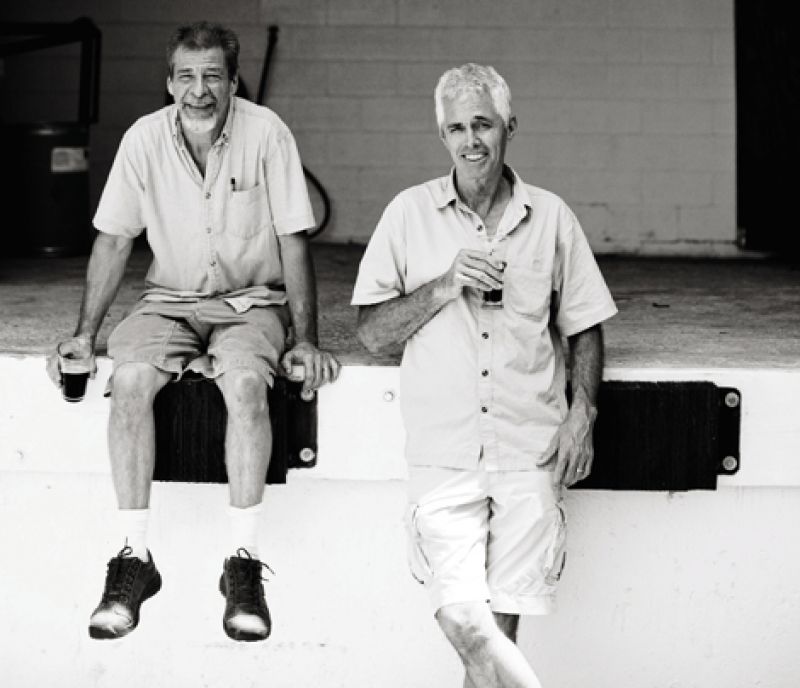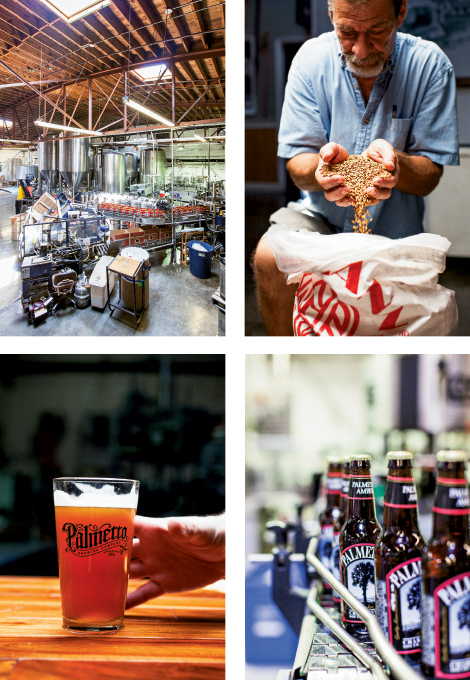
He would never admit it, but Palmetto co-owner Ed Falkenstein is the pioneer of craft brewing in South Carolina. Opening in 1993, Palmetto established itself as the first brewery in the state since Prohibition. Since then, it has grown into one of the most recognized brands in town, brewing upwards of 4,000 barrels annually, with bottles and tap heads found throughout the Lowcountry.
But it all began nearly 3,000 miles across the country in 1986 when Ed and Louis Bruce (who has become more of a silent partner in the past few years) were windsurfing on Oregon’s Columbia River Gorge. “There was a small brewery called Full Sail, which is now huge, along the river,” remembers Ed. “In the evenings, we would go there to drink beer and tell windsurfing lies. We peered into the brew room, and I said, ‘I know everything they’re doing in there, I could do it,’” notes Ed, who has a degree in chemical engineering. “For years we worked on putting it together. When we went to the bank for a loan, they told us they had three risky investments then: a clam farm, an ostrich farm, and us. I think we’re the only one still around.”
The company started making an amber style, then brought in the pale ale, followed the next year by their lager and porter. And for more than a decade, they brewed those four styles exclusively. “We certainly wanted to do seasonal,” says Ed. “But for a long time we were fighting just to keep up with what we were already making.”
A few years ago, they slowly began to introduce seasonal and small batch beers. In collaboration with their next-door neighbor, Charleston Coffee Roasters, they crafted an Espresso Porter in 2008, followed by a Watermelon Wheat in 2010, and an IPA in 2011. In addition, a rotating group of seasonals called the “Bocat” series benefit the Charleston Animal Society, and in honor of last year’s 125th anniversary of Charleston’s devastating 1886 earthquake, they released Aftershock, a dry-hopped, unfiltered steam beer.
And though he’s nearing 60, Ed has no plans to retire. “The best part of my job is I can bring my dog to work,” he says. “I don’t wear a watch. I don’t own a cell phone, and I’m not constrained in the mornings. My best days are the days I’m working my ass off. I still enjoy all aspects of my job.”
As for the future of Charleston’s oldest brewery, Ed hopes to increase production over the next few years, but says, “Mostly, I’d like to just be able to supply our local demand without running out all the time.” It appears it’s still smooth sailing for this senior company that got its inspiration on the Columbia River decades ago.

(Clockwise from top left) Palmetto Brewing Company operations; Ed Falkenstein examines a bag of malted barley; bottles get labeled prior to being boxed for shipment; a pint of Palmetto’s Pale Ale
Suds to Sample
Grab a pint of these stand-out Palmetto brews
Espresso Porter: a 5.7% ABV, full-bodied porter that uses a specialty espresso blend of Costa Rican, Guatemalan, and Kenyan coffees from its neighbor Charleston Coffee Roasters. Pairs best with grilled red meats, chocolate, or coffee desserts.
Pale Ale: this 5.6% ABV has a hazy amber hue and flavors of pine and citrus. It’s a nice complement to the heat of spicy foods such as Asian dishes, as well as Colby and parmesan cheese.
Ginger Slap: this 6.0% ABV one-off draft offers a malty, spicy, and fresh flavor. Try it with sushi and wasabi or pad Thai. It can also make a nice accompaniment to a beef dish.
Tours & Tastings
289 Huger St., Charleston
(843) 937-0903, www.palmettobrewingco.com
Wednesday & Friday, 3-5 p.m.
Tastings are free; six pack, $9.
No reservations needed.